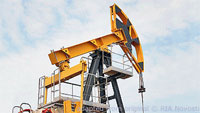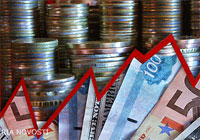Oil, budget risks in the way of high rating for Russia — S&P
Interfax - 8.10.12 - JRL 2012-146
MOSCOW. Aug 10 (Interfax) -Standard & Poor's (S&P) analysts have explained why Russia cannot join the group of reliable investors with A ratings - it is down to oil and budget risks.

A group of Standard & Poor's analysts led by Kai Stukenbrock said that the agency was unwilling to upgrade Russia's long-term credit ratings from the current BBB. They blame the old Russian woes of dependence on oil prices, the government's reluctance to carry out reforms and numerous budget risks.
S&P upgraded Russia's foreign currency short-term rating at the end of June to A-2 from A-3. The long-term national currency rating remained at BBB. This corresponds with the ratings of several Latin American countries, such as Brazil, or Peru, for example.

Russian economy will expand more slowly than before crisis
The agency's basic outlook scenario puts the average price of oil in 2012-2015 at $100 per barrel.
GDP will climb 3.5% per year right up until 2015 due to structural problems in the economy and 4.1% this year. The S&P outlook for growth in Russia is more optimistic than the government's or the that of the IMF.
GDP per capita will be $13,500, which corresponds to the average level for countries with a BBB rating.
Overall, the Russian economy will grow more slowly than before the crisis.
There are problems, but there will not be reforms
Structural problems that slow down economic growth include the government economic model: monopolies still have significant influence in the regions and competition is limited.
An underdeveloped infrastructure also hinders growth as well as a poor business climate, obstructing investment.
Earlier the government could count on fast GDP growth thanks to the constant rise in oil prices and there was no need to carry out reforms. Now everything has changed and that may encourage reforms.
However, a major alteration to the political course is unlikely as the composition of the political elite did not change after the elections. The authorities will not go for tough, often politically risky reforms because of reduced support for the government. An example is Vladimir Putin's promise not to increase the pension age.
S&P says the introduction of budget regulations and pension reforms is important.
Among the few positive reforms the agency pointed out the increase in ruble exchange rate flexibility. A more flexible Central Bank of Russia currency policy will help Russia overcome a plunge in oil prices: the ruble dropped 12% amid the recent drop in oil prices - this nearly by half offset the decline in oil prices in ruble terms.
One of the main political risks is the concentration of power in the presidential administration and the reduction in the real authority of Dmitry Medvedev's government.
Increased budget deficit threatens drop in ratings
Everything is so far in order with the Russian budget: there was a surplus of 1.6% of GDP in 2011. Now Russia is a net-creditor, which means a rather strong financial position.
However, that is unlikely to last long and a change of $10 in the oil price will lead to a change in state revenue of 1.4% of GDP. In a short space of time prices could have a significant impact on state finances.
There will be a budget deficit in 2012 and by 2015 the deficit will grow to 1.5% of GDP. By 2014 Russia will stop being a net-creditor.
If oil prices fall the government will sooner or later have to cut spending, increase borrowing and even speed up privatization. The situation can be helped by introducing a budget regulation that ties spending to long-term oil prices.
If the budget deficit exceeds the forecast then Russia's rating will be downgraded.
If the government does carry out reforms that encourage faster GDP growth, the return to a balanced budget and less dependence on oil price fluctuations then the agency promises to upgrade Russia's rating.
Offshore companies harm Russian foreign economic position
The current account surplus in 2012 will be 3.7% of GDP, but it will disappear by 2015.
Different foreign operation and debt payments will take 67% of current account revenue and available reserves. This will climb to 80% by 2015.
Companies transferring revenue from exports into tax havens, for example, Cyprus, are reducing Russian revenue. The typical scheme is the following: offshore companies buy oil at below market prices and then sell at market prices and the difference goes into the accounts of these companies. As a result the volume of Russia exports is lowered by 5% of GDP per year.
Keywords: Russia, Economy, Business, Investment, Trade - Russian News - Russia - Johnson's Russia List
MOSCOW. Aug 10 (Interfax) -Standard & Poor's (S&P) analysts have explained why Russia cannot join the group of reliable investors with A ratings - it is down to oil and budget risks.

A group of Standard & Poor's analysts led by Kai Stukenbrock said that the agency was unwilling to upgrade Russia's long-term credit ratings from the current BBB. They blame the old Russian woes of dependence on oil prices, the government's reluctance to carry out reforms and numerous budget risks.
S&P upgraded Russia's foreign currency short-term rating at the end of June to A-2 from A-3. The long-term national currency rating remained at BBB. This corresponds with the ratings of several Latin American countries, such as Brazil, or Peru, for example.

Russian economy will expand more slowly than before crisis
The agency's basic outlook scenario puts the average price of oil in 2012-2015 at $100 per barrel.
GDP will climb 3.5% per year right up until 2015 due to structural problems in the economy and 4.1% this year. The S&P outlook for growth in Russia is more optimistic than the government's or the that of the IMF.
GDP per capita will be $13,500, which corresponds to the average level for countries with a BBB rating.
Overall, the Russian economy will grow more slowly than before the crisis.
There are problems, but there will not be reforms
Structural problems that slow down economic growth include the government economic model: monopolies still have significant influence in the regions and competition is limited.
An underdeveloped infrastructure also hinders growth as well as a poor business climate, obstructing investment.
Earlier the government could count on fast GDP growth thanks to the constant rise in oil prices and there was no need to carry out reforms. Now everything has changed and that may encourage reforms.
However, a major alteration to the political course is unlikely as the composition of the political elite did not change after the elections. The authorities will not go for tough, often politically risky reforms because of reduced support for the government. An example is Vladimir Putin's promise not to increase the pension age.
S&P says the introduction of budget regulations and pension reforms is important.
Among the few positive reforms the agency pointed out the increase in ruble exchange rate flexibility. A more flexible Central Bank of Russia currency policy will help Russia overcome a plunge in oil prices: the ruble dropped 12% amid the recent drop in oil prices - this nearly by half offset the decline in oil prices in ruble terms.
One of the main political risks is the concentration of power in the presidential administration and the reduction in the real authority of Dmitry Medvedev's government.
Increased budget deficit threatens drop in ratings
Everything is so far in order with the Russian budget: there was a surplus of 1.6% of GDP in 2011. Now Russia is a net-creditor, which means a rather strong financial position.
However, that is unlikely to last long and a change of $10 in the oil price will lead to a change in state revenue of 1.4% of GDP. In a short space of time prices could have a significant impact on state finances.
There will be a budget deficit in 2012 and by 2015 the deficit will grow to 1.5% of GDP. By 2014 Russia will stop being a net-creditor.
If oil prices fall the government will sooner or later have to cut spending, increase borrowing and even speed up privatization. The situation can be helped by introducing a budget regulation that ties spending to long-term oil prices.
If the budget deficit exceeds the forecast then Russia's rating will be downgraded.
If the government does carry out reforms that encourage faster GDP growth, the return to a balanced budget and less dependence on oil price fluctuations then the agency promises to upgrade Russia's rating.
Offshore companies harm Russian foreign economic position
The current account surplus in 2012 will be 3.7% of GDP, but it will disappear by 2015.
Different foreign operation and debt payments will take 67% of current account revenue and available reserves. This will climb to 80% by 2015.
Companies transferring revenue from exports into tax havens, for example, Cyprus, are reducing Russian revenue. The typical scheme is the following: offshore companies buy oil at below market prices and then sell at market prices and the difference goes into the accounts of these companies. As a result the volume of Russia exports is lowered by 5% of GDP per year.